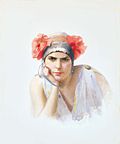Théodore Jacques Ralli
Théodore Jacques Ralli ( Greek Θεόδωρος Ράλλης ; born February 16, 1852 in Constantinople ; † October 2, 1909 in Lausanne ; actually Theodoros Jannis Rallis ) was a French painter of Greek origin . His painting style, his genre and landscape paintings are assigned to the French academic painting school of the late 19th century. He is considered one of the most important painters of Orientalism .
biography
He was born under the name Theodoros Jannis Rallis in Constantinople as the son of a wealthy Greek merchant family who originally came from the island of Chios. He studied in Paris on a scholarship from King Otto of Greece , as a student of the orientalist Jean-Léon Gérôme . His works were first exhibited in the Paris Salon in 1875 . Ralli became a member of the Société des Artistes Français , founded in 1881 , the organizing committee of the art exhibition of the Paris Salon, which praised him for his work in 1885 and awarded him the Silver Medal in 1889. A year later, Ralli was appointed to the commission of art critics at the Paris World's Fair. In later years, he was awarded the Legion of Honor by the French state for his services to the arts .
Ralli often traveled to Asia Minor, Palestine and Egypt to collect inspiration for his works. He spent most of his time between Paris and Cairo. He had a second studio in Cairo.
In 1881 he married Julia Maurokordatos, with whom he had a child, the daughter Katharina (1882–1948), who later became the wife of the writer Nikolaos Politis . Ralli's wife died at the age of 29, in 1888. Seven years later he married Maria Mauromichalis a second time. However, this marriage failed after a short time.
At the suggestion of his friend Demetrios Vikelas , the then IOC president, he exhibited his works for the first time in 1896 during the Olympic Games in Athens, also in Greece. In the next few years further exhibitions of his pictures followed in Greece, Italy, Austria, Germany, Switzerland and especially in France.
Works
Like his teacher Gérôme, Ralli mainly dealt with topics from the Orient that seemed exotic in the eyes of the Europeans of the time. Nonetheless, these works show scenes from the contemporary Orient and not from another epoch far back in the past. They are characterized by their high level of realism and authenticity. In addition to his oriental works, Ralli also liked to deal with religious topics of Orthodox Hellenism, in which he portrayed people with a unique piety and innocence that sometimes tended towards romanticism. In one of his best-known works, the 1905 painting Die Beute , he addressed the difficult living conditions of Orthodox Christians in Muslim Turkey. Ralli also painted portraits, his most famous being Medea .
gallery
literature
- Ralli, Théodore Jacques . In: Hans Vollmer (Hrsg.): General lexicon of fine artists from antiquity to the present . Founded by Ulrich Thieme and Felix Becker . tape 27 : Piermaria – Ramsdell . EA Seemann, Leipzig 1933, p. 584 .
- Emmanuel Bénézit : Dictionary of Artists. Volume 11. Gründ, Paris 2006, ISBN 2-7000-3081-8 , p. 633.
Web links
- Short biography Ράλλης Θεόδωρος , National Gallery (Athens) (Greek)
- Website with a section on Ralli and some of his works
| personal data | |
|---|---|
| SURNAME | Ralli, Théodore Jacques |
| ALTERNATIVE NAMES | Rallis, Theodoros (real name); Ράλλης, Θεόδωρος (Greek) |
| BRIEF DESCRIPTION | French painter of Greek origin |
| DATE OF BIRTH | February 16, 1852 |
| PLACE OF BIRTH | Constantinople |
| DATE OF DEATH | October 2, 1909 |
| Place of death | Lausanne |




